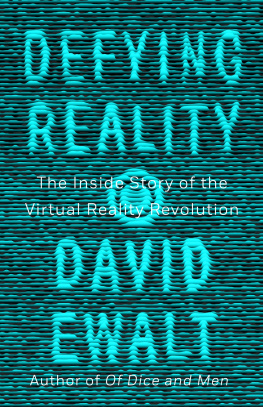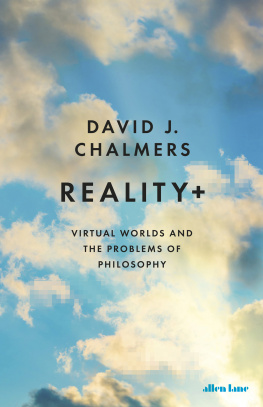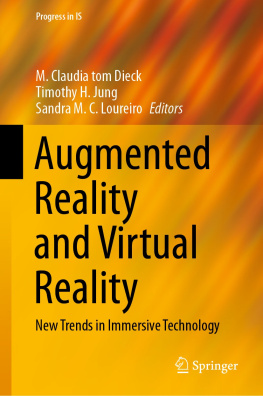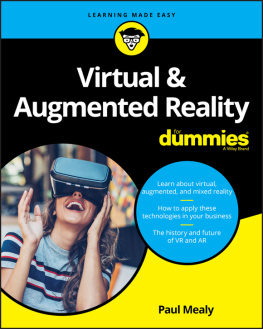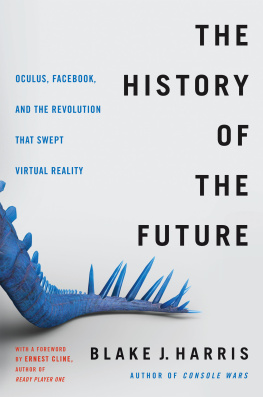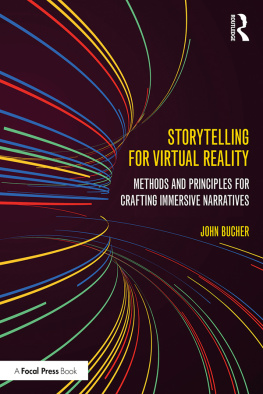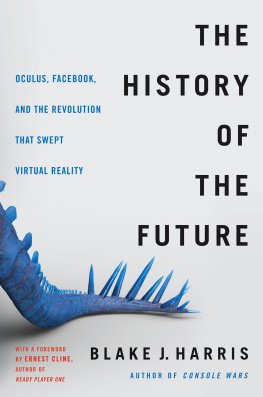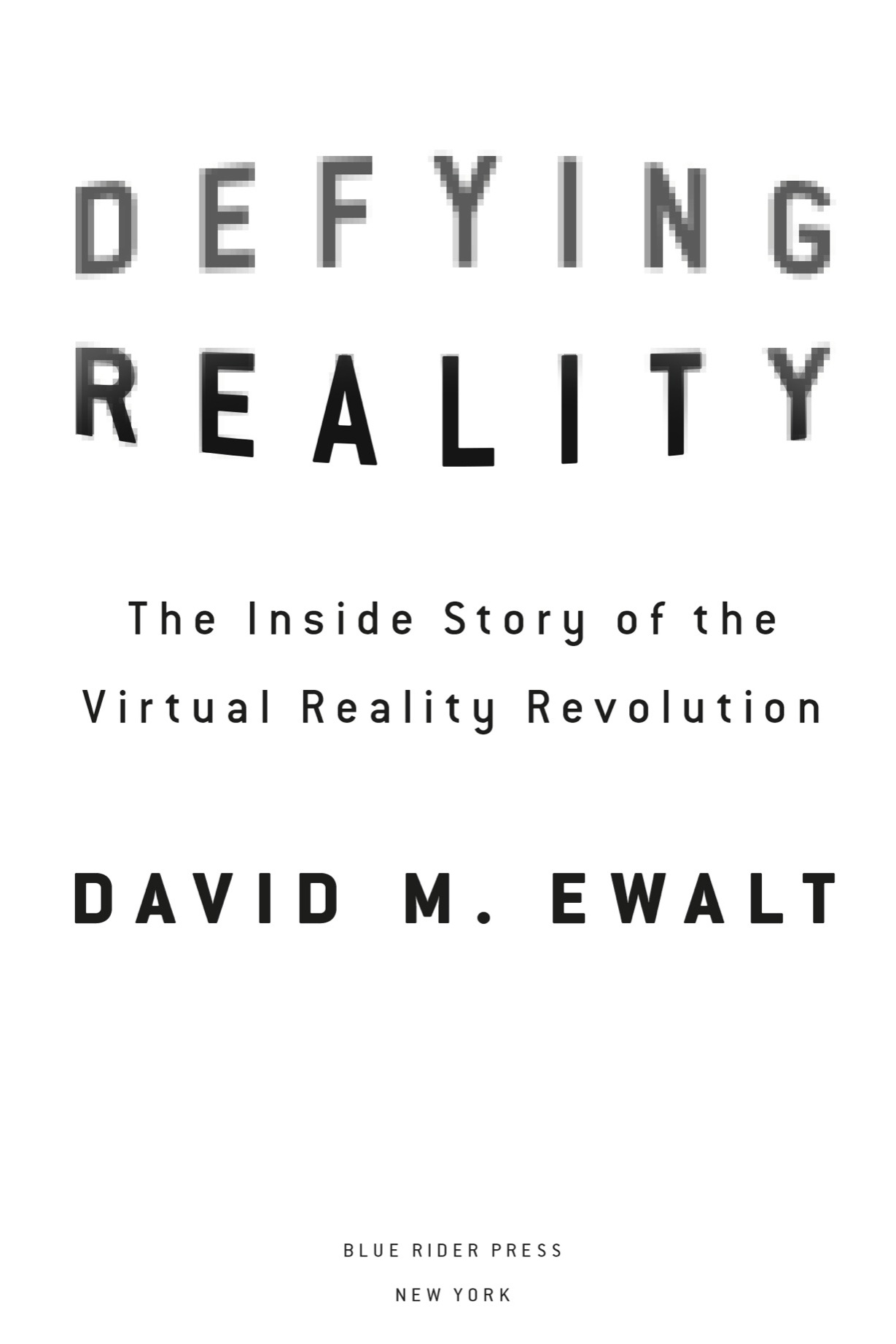Copyright 2018 by David M. Ewalt
Penguin supports copyright. Copyright fuels creativity, encourages diverse voices, promotes free speech, and creates a vibrant culture. Thank you for buying an authorized edition of this book and for complying with copyright laws by not reproducing, scanning, or distributing any part of it in any form without permission. You are supporting writers and allowing Penguin to continue to publish books for every reader.
Blue Rider Press is a registered trademark and its colophon is a trademark of Penguin Random House LLC
Library of Congress Cataloging-in-Publication Data has been applied for.
For my grandfather Michael E. Spinapolice, who bought my first computer
Prologue
THE SPARK
Its 1894, and a twenty-year-old Italian aristocrat pushes a button on his desk, causing a bell to ring on the other side of the room. He wakes his mother in the middle of the night to show her what hes created. He calls it a wireless telegraph.
Its 1927, and a twenty-one-year-old Utah farm boy transmits a live image from a camera, through the air, to a glowing screen. Thats it, folks, he announces. Weve done itthere you have electronic television.
Its 2012, and a nineteen-year-old video game fan from California fits a lightweight plastic headset over his eyes, presses a button on a computer, and is transported to another world. I am making great progress, he tells his friends later in a post on an Internet forum. Really excited about this.
Weve already entered the age of virtual reality, though you probably havent noticed it yet. Youve almost certainly heard of VR, seen the news stories and magazine covers, read about how its the hot new medium for 3-D movies and video games. Its possible youve tried one of the basic VR viewers that use a phone for a screen. Or maybe youve played with or own a high-end VR headset that connects to a computer.
But unless youre one of the handful of people who live on the sharpest point of the cutting edge, you probably havent noticed that the release of those gadgets was the dawn of a whole new era. This isnt just another beat in the accelerating tempo of technological progress; its the start of a brand-new song. At the very least, its a moment as significant as the birth of radio or television; quite possibly, its the beginning of a fundamental change in what it means to be human.
No, seriously.
I know that sounds crazy. But this technology gives us the ability to do crazy things. A virtual reality is a computer-generated environment that you can see and hear, typically through the use of a high-tech headset, so that it appears youre actually inside the simulation. Good VR even lets the user interact with and change the environment. Now think about that: Creating a whole new world that people can inhabit used to be something only deities could do. The ancient Greeks said Gaia gave birth to the heavens, the sea, and the mountains; in the twenty-first century, an engineer models them on their laptop.
And think about what it means to inhabit one of these virtual worlds. You and I are bound to the physical worldwe have to work with the body we have in the place where we are. But as virtual reality simulations get better, both of those limitations start to go away. Suddenly anyone can see what its like to stand on the peak of Mount Everest. Or a person who cant walk can experience a marathon from the perspective of an Olympic champ. And if fantasy is indistinguishable from reality, why stop there? Take a walk across Marshell, take a walk across Narnia. Become a dragon and fly through the clouds.
Crazy, right? I dont know what it will do to humanity when we can experience our fantasies in a manner thats indistinguishable from real life, but I do know that the invention of this technology is a pretty big deal. When we talk about VR, were not just talking about gadgets that play 3-D video games.
In the interest of transparency, I should admit that Im exactly the type of person youd expect to get overexcited about VR. When I was a child I was obsessed with fantasy literature, movies, and games. I memorized the maps in books like The Hobbit, knew the name of every obscure Star Wars character, and spent countless hours playing Dungeons & Dragons with my friends. I loved video games too, and I was interested in computer programming. In other words, I was a stereotypical 1980s nerd.
Then I read William Gibsons Neuromancer, and it blew my adolescent mind like a bolt of neon lightning. In this cyberpunk novels dystopian future, hackers transfer their consciousness directly into the Matrix, a virtual reality representation of a global computer network, and explore cyberspace the same way a team of adventurers might delve into a dungeon in one of my D&D games. Gibsons console cowboys navigate traps, fight powerful security programs, and escape with stolen data treasure. A world where you can fight monsters and still be a computer genius? I would have moved there if I could.
I spent my teenage years devoted to anything that had to do with virtual reality. I devoured books written by novelists like Gibson, Bruce Sterling, Rudy Rucker, and Neal Stephenson, and used my allowance to buy a subscription to Wired magazine. I lost interest in D&D and started playing sci-fi role-playing games like Shadowrun and Cyberpunk 2020, where instead of a knight or a wizard, my character could be a netrunner or a decker. I even paid to see cyberpunk B movies like The Lawnmower Man and Johnny Mnemonic in theatersmultiple times. And I spent what little free time I had left on my computer, connecting to dial-up bulletin-board systems with a 2400-baud modem, imagining I had become a console cowboy. I was on the VR bandwagon and couldnt wait for the future.
But then I got burned. When I was eighteen years old, the Japanese video game company Nintendo announced the Virtual Boy, a portable video game console that could simulate immersive 3-D graphics. It looked like something out of one of my cyberpunk novelsa futuristic headset in red and black plastic. For the better part of a year before it was actually released, TV commercials and articles in Nintendo Power magazine raised my expectations to epic levels. At night I dreamed of video game characters jumping off TV screens and running all around me in glorious virtual reality. When it was finally released, the Virtual Boy cost nearly $200. But I was away at college, so I bought one with the money my parents gave me for textbooks.
It sucked. Oh, sweet Mario of the Mushroom Kingdom, how it sucked. The Virtual Boy had a weird red-and-black monochrome screen that gave me eyestrain and migraines. The graphics werent immersive 3-D, they just had an illusion of depth thanks to stereoscopic trickery. And the games were nothing specialpinball, tennis, baseball, nothing that made me feel like Id been whisked away into another reality. Just a few minutes of play made me want to vomithalf from disgust and half from the pounding headaches.

